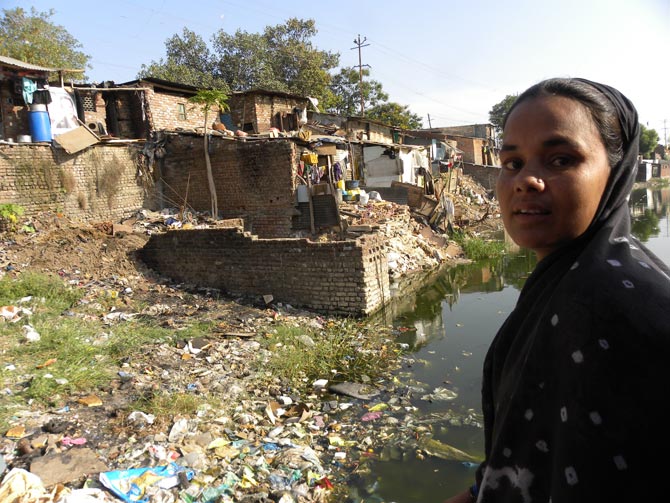
Is the Gujarat model of development in evidence all across Vadodara?
Vaihayasi Pande Daniel/Rediff.com and Patrick Ward meet five different communities in the district. Are they all on the road to affluence? Or is prosperity a distant mirage for some of them?
The dusty, mucky, slum of Hathi Talav sits by the side of a pond in the middle of Vadodara city, slightly to the northeast.
Between it and the murky water is a shoreline of rubbish -- although they try to burn as much of it as they can, to reduce the stink and curb its spread.
Goats, cattle and chickens navigate between children playing in the narrow corridors between the ramshackle houses. A couple of huts house herds of buffaloes that do not belong to locals, but are paid to look after.
"Progress is for big people, not small people," says Sultan Khan Pathan. He is a garment vendor and among the 25 Muslim families who make this slum their home. "There are only promises."
Water is also a major problem for these slum dwellers. They take innumerable 20-litre plastic dabbas (canisters) out of the area, every day, to fill up and store them outside their homes. There is no fresh water in the slum.
Zubeida, 25, lives with her three children, her husband, who makes bags in a workshop, her brother-in-law and his parents in two rooms at the very edge of the garbage-ridden talav (pond). Beyond her door is a stinking wasteland.
Zubeida says angrily, "See, this is how we live!"
She says everyone in the slum makes sure they vote. But she has few friendly words for the politicians and their promises of development. "They only come here for our vote."
Despite the other issues, Zubeida says there is electricity in their houses, and the Hathikhana municipal school, not too far away, serving 500 children, is good. The electricity allows the families in this area to use their two or three television sets, shared between all the homes. "Do we look like we could have one television per home?" one of them asks sarcastically.
Galloping inflation does not make life any easier. "Potatoes are Rs 20 a kilo. Onions are also Rs 20 a kilo."
And earnings are paltry. Arif Diwan earns Rs 200 a day driving an autorickshaw. Ishaq Diwan pulls in Rs 200 daily doing this and that.
The main problem comes during the monsoon as water rises over four feet, leading the residents to move into the local school. During this time, the toilets have become useless, and people have to do their best in the open.
The monsoon also has an impact on work. Ibrahim, a painter, can earn up to Rs 1,000 a day when he has a job in hand, but in the monsoon, because of the humidity, jobs vanish.
The community feels it has missed out on development altogether, but Bharatiya Janata Party supporters in Vadodara -- one of the two Lok Sabha constituencies where Narendra Modi is contesting from -- argue that it will come with time.
Please ...
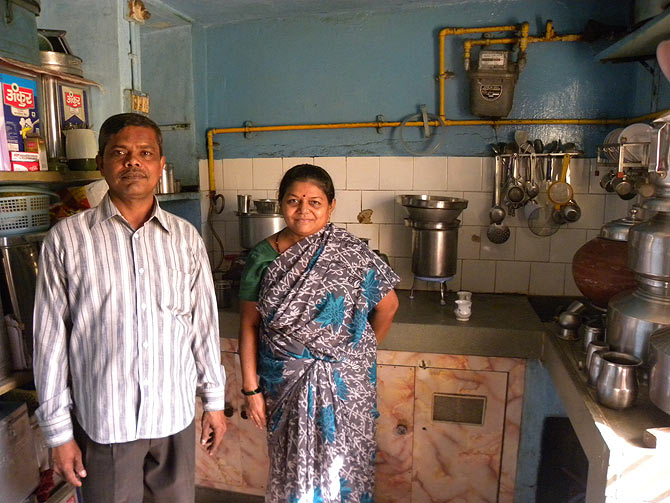
In the Hujarat Thekda neighbourhood in Vadodara, Santosh Yadav Rao Navle is doing better than people in the city's slums.
The 50 year old has lived in the same home for 40 years -- he lives there with his wife Neetaben, son Pratik and mother Susheela, who once worked as an attendant in a government mental hospital. He makes Rs 12,000 a month as a fitter for submersible pumps at the Gujarat Industrial Development Centre, where he has had a job for the last 22 years.
Neetaben, 43, works from home assembling simple, low-cost wedding jewellery (about Rs 3,000 a set). Its components are sent to her by her sister in Mumbai.
Together they could afford the Rs 300,000 needed to send Pratik for a three-year diploma course in IT. They even bought him a laptop. And Santosh owns a motorcycle.
He wants a change in the government at the Centre to ease the conditions under which the family lives. "There's too much inflation under the Congress," he says. "I will vote BJP."
Santosh is impressed with the development that has taken place under Modi's watch. "Modi has built a lot of roads and bridges," he says.
Adds Neetaben, "All the things you need for life are easily available -- electricity, roads, toilets."
"For the municipal schools you pay a token amount, and for girls it's totally free," she adds, as she makes tea, and puts together plates of snacks in her well-stocked kitchen.
The couple feel employment has increased.
Neetaben works for three or four days a week assembling jewellery for weddings, and makes around Rs 500 a week for it.
This area seems in stark contrast to Hathi Talav.
Why was that? "At a lower level people are still not working well in the government," says Santosh, "Modi is doing a good job, but there is more trickle-down on the way."
House prices in the area are low, says Santosh. This is in part due to the occasional violence that has flared up between the communities.
"It's a fairly inflammable area," says Santosh. "Property prices are not good -- you never know what can happen."
He could sell his home for more than Rs 1 million, he adds, if it was located in a more peaceful area. But this home is only worth Rs 300,000 or Rs 400,000.
When Pratik qualifies, the couple is hopeful he can get a good job away from Vadodara. Then they might be able to move away too.
Please ...
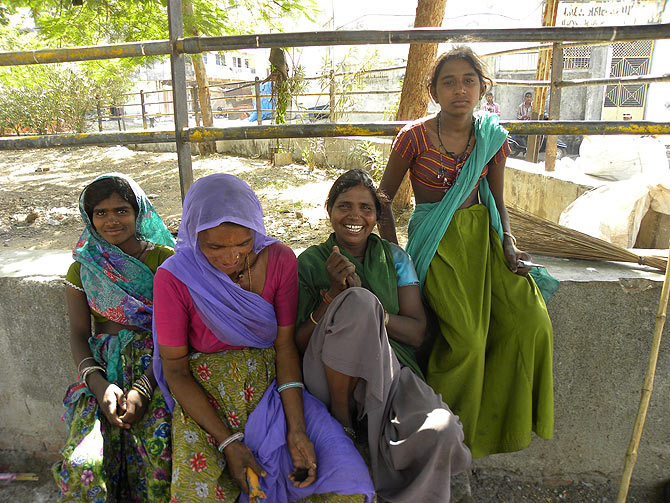
The group of women make a living meticulously sifting trash in the city.
Kamala, Parul, Kalee and Kripa are bangarwalis, Dalits. From sun up to sundown they wander from garbage heap to garbage heap across Vadodara.
They earn about Rs 300 to Rs 400 a day, on an average, unless they have a windfall. A kilo of aluminum earns them Rs 80. A kilo of plastic earns them Rs 20 and a kilo of paper earns them Rs 3.
They are residents of Vadodara, natives of Rajasthan. Parul hails from Nagaur district, central Rajasthan, and did not go home to vote; she says her gharwallahs would have decided who needs to be voted for.
Kamala, her daughter Kripa and niece Kalee belong to Baswada district, near Bundi, southeast Rajasthan, and Kamala did go home to cast her vote. She voted for the Congress, but cannot cite reasons for her choice.
It is random, she says. Almost like making a wish. The last time she voted for the lotus.
Sorting rubbish is a tough task. Awfully smelly, of course. The women keep their heads covered to prevent the odour from getting into their hair and bathe as soon as they get home.
It is apparently lucrative, but the women are reluctant to say so. "They are quite wealthy," says one bystander. "Look how much gold they wear."
"They have fancy homes back in their village," says another.
Please ...
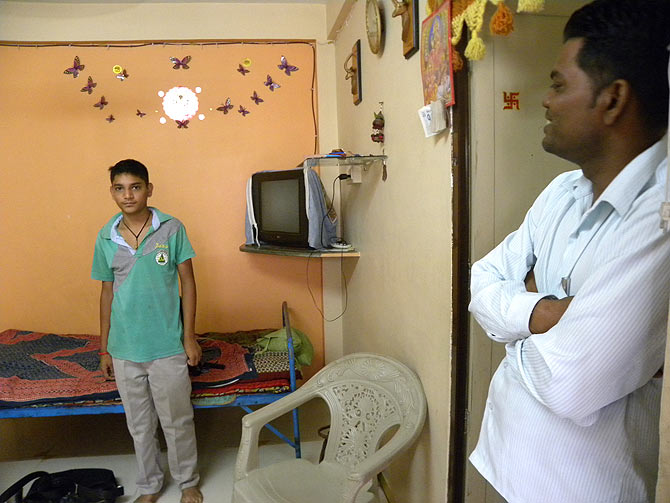
Pravin Parmar, 30, was just five when his father died.
He, his elder brother Suresh and parents, Parvati and Manilal, had only recently moved from the village of Shihor in Padra municipality, to the nearest big city, Vadodara.
His father was unable to eke a substantial enough living from farming for the family in the village, so they headed to the city.
But Manilal soon became sick and passed away.
Parvati took up work on construction sites to support her sons. As soon as Suresh was old enough, he quit school, got a job and works in a chemical plant nearby.
Pravin kept studying. "SSC pass. I was a good student. But to continue studying you need money," he says matter-of-factly, with a tinge of regret.
He trained himself to drive, then got jobs painting billboards and signs. He says he was quite good at it and enjoyed his work. But then sign painting went digital and he was left without a profession. So he became a driver. He has been earning a living as a driver for 8 to 10 years now.
When the Parmars moved to the city they made Kalali Fatak, a slum in the southwest part of the city, their home. Subsequently, both brothers got married. Each has two children -- Suresh's children are Akash, 15, and Bhavika, 9; Pravin's children are Archita, 9, and Keval, 6. Nine of them lived in two slum homes in the colony.
The city authorities decided to raze their slums more than a year ago as part of an ongoing project to rehouse slum dwellers in Vadodara. The slum dwellers of Kalali Fatak were offered housing in three different brand new tenement housing projects in roughly the same area.
The Parmars shifted about a year ago to two apartments hardly two kilometres away.
Suresh and Pravin paid Rs 13,000 each to the municipality -- Pravin specifies that they were not bribes -- and were given proper receipts before the families moved.
Pravin's apartment is on the fourth floor, Suresh's is on the ground floor, in the same building, one of 22 plus buildings. Suresh has gone on to refurbish his home -- it has been painted and has a tiled floor.
Pravin is very happy with his new home. He says it is much nicer than living in a slum. Far better, to have running water in your home and proper toilets and bathrooms. His wife Ritu though misses some of her companions from the slum, who got apartments in other projects, although not that far away.
His new housing society has all the facilities of a city housing society -- garbage collection, 24-hour electricity and water. His electricity bill is Rs 1,200. His water bill is Rs 300. He had to pay for electricity in the earlier slum, but not for water. The water is clean.
The housing society is self-administered and has a cooperative board looking after building issues.
Pravin also owns an autorickshaw that he drives in his spare time to earn extra cash or uses to take the family out for a spin.
A hospital is being built nearby. A new flyover has been constructed to ease travel to the city centre. The Dr Syama Prasad Mukherjee municipal school at Atladara is three kilometres away. The cousins travel there by autorickshaw daily and pay Rs 300 per month for this facility.
The Parmars own a small house in their village, but don't go there much.
Pravin will vote for BJP. His new home, he points out, was the result of good governance in the state. He has heard that some of the housing societies built for former slum dwellers have developed leaks. But that has not happened in his society.
Please ...
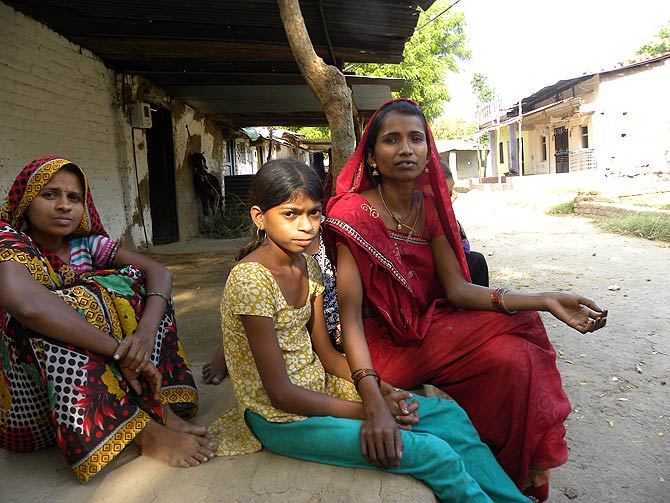
The village of Shihor, in Padra muncipality, that has about 600 voters, seems quite a long way from the supposed economic miracle that is Gujarat, although the road there is modern and sturdy.
The village is about a half hour drive from Vadodara, a city with its bridges and newly built social housing.
Life in the village is more of a struggle.
Water is one of the biggest problems the villagers face. There are around 200 taps in the village, but this one source of clean water is unreliable. The water is brackish sometimes and often does not flow. Bore wells take care of irrigation needs.
During the monsoon, the village is often flooded, and the villagers have to take refuge in the local school. At this time the area gets very muddy, and mosquitoes come in beastly swarms, bringing the threat of malaria and dengue.
Jyotika Purshottam Shivaji, 21, who has studied up till Class 7, and is one of the few villagers who speaks better Hindi, says she does 'parlouring'. She is a beautician and makes around Rs 100 rupees a day preparing brides for their big day or similar beauty jobs. She takes in a little sewing as well.
She hopes the village will see some development. There needs to be something for the women to do, she says.
"I hope Modi is elected because he will change the village if he becomes prime minister, like he changed Baroda," she says.
Jyotika's husband works at a nearby pharmaceuticals company, where he makes Rs 150 a day. Her brother-in-law is a farmer, and grows jowar, cotton and wheat. She has been married for five years and lives with her in-laws in a small home.
Income from agriculture is steadily diminishing, she says.
The family can earn around Rs 5,000 per quintal of cotton that they harvest. One home can make around Rs 50,000 a year this way. The villagers also sell 300 to 400 litres milk to the government dairy in Baroda every morning.
"We don't take the crop into the city ourselves," says Jyotika, "and the middlemen take much of the profit."
There is a school in the village, but it only has classes up to Class 6. For anything above this, children have to travel using their own means to a school 9 km away. The nearest hospital is in Padra town, 10 km away. Padra can be reached by auto for Rs 10 per head.
Jyotika's family -- her father is a watchman -- is from Manjalpur, Baroda. What happened in Baroda will slowly trickle down and arrive here, she says.
Others in the village are as optimistic about Modi coming to power. We are told the village -- that is a mixed community of Barias, Varsavas, Wankar and Dalits -- will mainly vote for the Bharatiya Janata Party.
"Maybe the changes won't be enough," says a villager named Manish, "but things are slowly changing." He points to a lamp implanted on an electricity pole. "A street light was installed just a month ago, which we really needed."